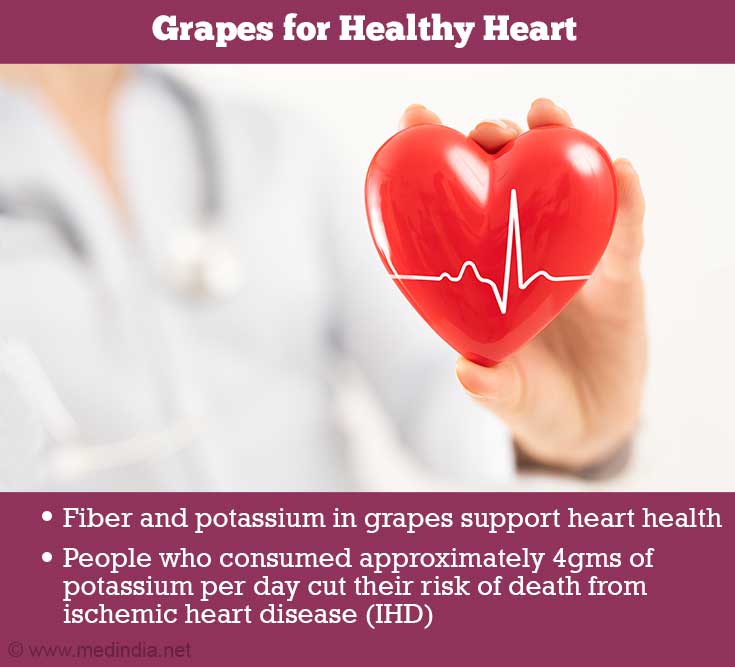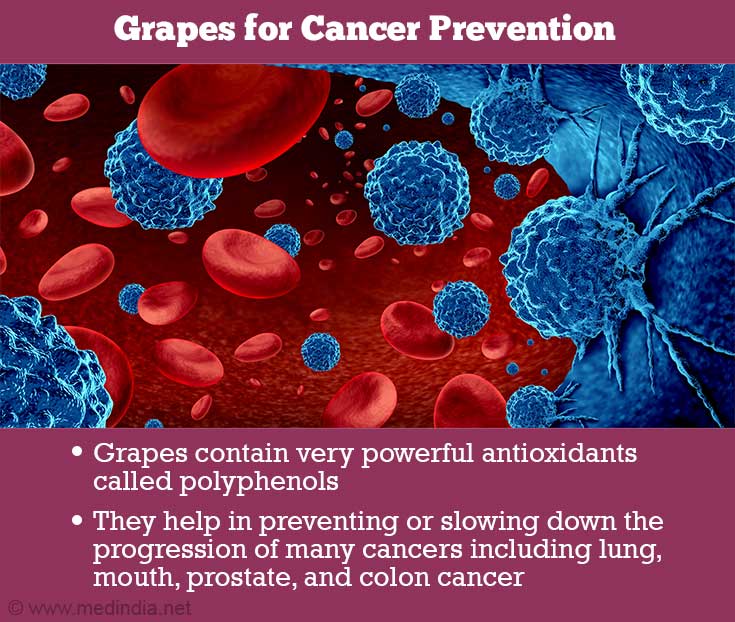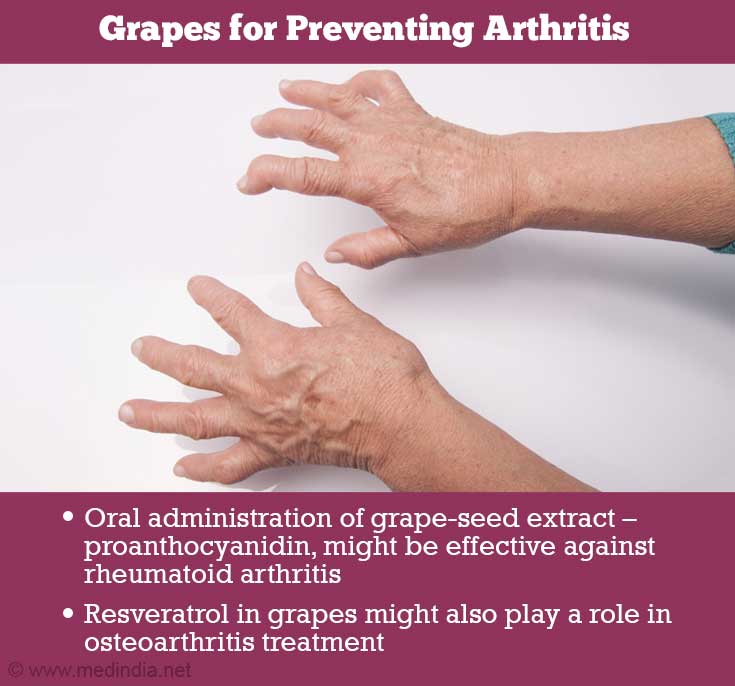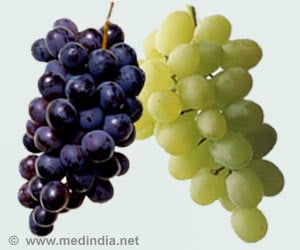- Dohadwala, Mustali M., and Joseph A. Vita. “Grapes and Cardiovascular Disease.” The Journal of Nutrition 139.9 (2009): 1788S–1793S. PMC. Web. 24 May 2015.
- Khadem-Ansari MH, Rasmi Y, Ramezani F. Effects of red grape juice consumption on high density lipoprotein-cholesterol, apolipoprotein AI, apolipoprotein B and homocysteine in healthy human volunteers. Open Biochem J. 2010;4:96-9. doi: 10.2174/1874091X01004010096. Epub 2010 Dec 15. PubMed PMID: 21633724; PubMed Central PMCID: PMC3104594.
- Joseph JA, Shukitt-Hale B, Willis LM. Grape juice, berries, and walnuts affect brain aging and behavior. J Nutr. 2009 Sep;139(9):1813S-7S. doi: 10.3945/jn.109.108266. Epub 2009 Jul 29. Review. PubMed PMID: 19640963.
What are Grapes?
A grape is a fruiting berry that is small and round with smooth skin and semi-translucent flesh. There are over 8,000 grape varieties in a wide range of colors, sizes and flavors. Some types of grapes are very sweet – almost “cotton candy sweet” while others are a little more tart, some are green in color while others are purple and some contain edible seeds while others are seedless.
Grapes are native to Europe and Mediterranean regions but they are now cultivated all over the world. Grapes can be put into three broad categories –
1. Grapes that are used in recipes or eaten plain are called ‘Table grapes’
2. Grapes that are used to make grape wine are called ‘Wine grapes’
3. Grapes that are used to make dried fruit are known as ‘Raisin grapes’
Grapes are often used to make a wide variety of food products such as jelly, juice, jam, grape seed extract and grape seed oil.
Health Benefits of Grapes
Prevent Heart Disease: The fiber and potassium in grapes support heart health. People with the cardiovascular problem are often advised to reduce their intake of sodium but it is equally important to increase one’s intake of potassium. In a study on the relationship between potassium and cardiovascular health, it was observed that people who consumed approximately 4gms of potassium per day cut their risk of death from ischemic heart disease (IHD) almost in half as compared to those who consumed just 1gm per day.
Grapes get their color from natural compounds called flavonoids which are very powerful antioxidants. Resveratrol and quercetin are the two main types of flavonoids in grapes. They prevent free radicals in the body from damaging cells and they reduce the effect of LDL (bad) cholesterol on arteries. Quercetin has anti-inflammatory properties that reduce an individual’s risk of atherosclerosis.
Consuming grapes also increases the levels of nitric oxide in the blood which slows down the blood clotting process. This action is similar to anti-coagulant medications that are prescribed to people with cardiovascular disease as it reduces the individual’s risk of a heart attack.

Lower Cholesterol Levels: Grapes contain a compound called pterostilbene which is very similar to resveratrol. This compound has many health benefits including the ability to lower blood lipid count and cholesterol count. Elevated lipid and cholesterol levels have been linked to heart disease and stroke and so including grapes in your daily diet can help to lower your cholesterol levels and prevent heart problems. The skin of the grape contains saponins that bind to cholesterol and prevent their absorption by the body.
Promote Bone Health: Grapes contain a variety of micronutrients such as calcium, iron, magnesium, manganese, phosphorus, potassium and zinc. These trace metals are very important for good bone health and so including grapes in your diet will increase bone density, prevent calcium loss and prevent age-related bone problems such as osteoporosis.
Reverse Cognitive Decline: In a study conducted on rats, researchers observed that rats that were fed extracts containing pterostilbene had a reversal in age-related motor-skill decline. These rats also displayed significant improvement in cognitive function. Another study showed that people who had age-related memory decline experienced an improvement in memory tests within just three months of drinking blueberry juice (which contains pterostilbene). Researchers believe that this compound is unique because it can cross the blood-brain barrier and protect the cells from the damage caused by free radicals.
Prevent Cancer: Grapes contain antioxidants called polyphenols, which are very powerful and might slow down the progress or even prevent many cancers including lung, mouth, prostate and colon cancer. Cells that have been damaged by free radicals contribute to cancerous growth. The resveratrol in grapes helps the body to repair this type of cell damage and this can help in the prevention of cancer. Resveratrol also helps to prevent the reproduction of damaged cells, which in turn reduces the progression of the growth of cancerous cells. Furthermore, according to preliminary research, consuming grape juice might also help to reduce the severity of the debilitating side effects of conventional cancer treatments.

Reduce the effects of Diabetic Neuropathy and Retinopathy: Diabetes affects the tissues and organs in your entire body and two of the most common complications of diabetes are neuropathy and retinopathy. In diabetic neuropathy, the nerves are damaged and are unable to function effectively. This condition causes numbness in the hands or feet and in time, the individual starts to experience severe pain in these areas.
In diabetic retinopathy, it is the blood vessels in the retina that are affected and in time, it will lead to irreversible blindness. Early tests and studies indicate that the resveratrol in grapes can offer protection against diabetic neuropathy and retinopathy. In a study on diabetic rats, the ones that were given resveratrol for just two weeks had marked a reduction in the damage associated with these conditions.
Grape seed extract is also considered to be effective in controlling the damage caused by free radicals and recent research shows that it may prove to be particularly helpful in preventing diabetic retinopathy. Furthermore, magnesium plays an important role in preventing diabetic retinopathy as people with low levels of magnesium are at the highest risk of suffering from this condition.
Treat Constipation: Grapes are an effective remedy for constipation as they help to tone up the intestinal muscles. They also contain organic acids and cellulose which help in the elimination of wastes from the body. Grapes contain insoluble fiber which absorbs water but does not dissolve; thus the fiber in grapes provides bulk to stools allowing them to move easily through the gastrointestinal tract. People who suffer from constipation on a regular basis often become dependent on laxatives, which in turn can lead to poor intestinal muscle tone. This only serves to aggravate the underlying problem and does not offer a permanent solution. You can include grapes and raisins in your daily diet to promote proper digestion and elimination of wastes. Grapes also have high water content and this also helps to prevent constipation.
Treatment for arthritis: The role of grapes in the treatment of arthritis is not yet fully understood but there have been several animal tests to determine the extent of these benefits. Rheumatoid arthritis causes chronic autoimmune inflammation and this disrupts the formation of bone and damages the joints. In a study on the effects of grape-seed proanthocyanidin extract on mice, it was noted that the extract improved arthritic manifestations and researchers believe that it might be beneficial for the treatment of inflammation-associated bone destruction. In a separate test, researchers found that grape-seed proanthocyanidin extract, when administered orally, might be effective as an adjunct treatment for rheumatoid arthritis. This is of particular importance as the prolonged use of conventional anti-inflammatory drugs has severe side effects. Resveratrol in grapes might also play a role in the treatment of osteoarthritis. The anti-arthritic benefits of this compound are due to its anti-inflammatory abilities – resveratrol prevents the activation of the gene that causes the inflammation and thus eliminates arthritic pain at the source.

Weight Loss Diet: Grapes contain no unhealthy calories and are rich in nutrients and antioxidants making them the ideal snack for anyone looking to lose weight. They’re easy to handle and require no preparation and also work as a great substitute for sugar rich sweet snacks that pack on the pounds. You can include different types of grapes, whether green or red grapes or dried grapes, it scarcely matters. You can even consume grape juice or grape wine, but keep in mind that the grapes are not very high in fiber and the fiber in grapes is even lower when juiced.
Grapes Recipes
Grapes Salad
Ingredients:
- 1 ½ cups (225 grams) of seedless green grapes
- 1 ½ cups (225 grams) of seedless red grapes
- 2 cups fresh curd (yogurt)
- ½ cup full-fat milk
- 5-7 tablespoons slivered almonds or chopped walnuts
- 2 tablespoons brown sugar
- ½ teaspoon vanilla extract
Method:
- Pour the curd into a muslin cloth and allow it to hang for an hour until the excess water drains out.
- Place the hung curd in a bowl along with the milk, vanilla extract and one tablespoon of brown sugar. Whisk thoroughly until the mixture is smooth and creamy and then pour it into a serving bowl.
- Fold in the grapes carefully using a spatula so that the skin of the grapes remains intact. Refrigerate for an hour.
- Top off your salad with one tablespoon of brown sugar along with the almonds or walnuts and serve.
Roasted Grapes Granita
Ingredients:
- 1 kg green table grapes
- 1 ½ tablespoons sugar
- ½ teaspoon fresh lime juice
Method:
- Remove the stems and rinse the grapes thoroughly. Dry them with paper napkins or allow them to air dry under a fan.
- Heat your oven to 500 degrees. Place your grapes on a baking pan and roast them for 10-15 minutes until they are brown. Remove the pan from the oven and set aside until the grapes cool.
- Place the roasted grapes into a blender along with the sugar and lime juice and blend to get a smooth pulp.
- Pour this pulp into a muslin cloth and allow the juice to drain for 5-10 minutes. (Do not discard the juice, instead refrigerate it and have it instead of your regular glass of fruit juice).
- Place the drained pulp into a container and then pop it into the freezer. After an hour, take the container out and scrape it with a fork so that it remains firm and flaky. Repeat this every hour until the entire batch has frozen.
- Fluff the granita up with a fork once more and then scoop this delectable dessert into large glasses. For an added punch, pour a little chilled red wine over it before serving.
Beauty and Health Tips
- How to Pick the Best Grapes: When buying grapes, look for a bunch that still has the white “bloom” on it; while it may not be visually appealing, the bloom is an indicator of freshness. The grapes should be plump and fully ripe – these are the ones that have the best taste and a higher nutritive value. The stems of the grapes should be flexible and not dry.
- Skin Brightening Face Pack: Blend 10 grapes (you can use dried grapes if you like), a quarter of an apple and a two-inch piece of banana. Apply this paste to your face and leave it on for at least 30 minutes before rinsing it off with cool water. Grapes have mild astringent properties that will help to control sebum production while the banana in this face mask will nourish and moisturize your skin. Apples contain natural glycolic acid which will help to get rid of blemishes and brighten your complexion.
- Cleansing Hair Mask: Grapes and grape-seed oil are rich in antioxidants and several other nutrients that promote healthy hair growth. Apart from the vitamins in the flesh of the grapes, the seeds contain linoleic acid which helps to control hair loss. To make your hair cleansing mask, mix half a cup of fresh grape juice with a quarter cup of orange juice and the juice of one sour lime. Soak your hair and scalp with this juice and then rinse your hair after an hour before allowing it to air-dry. The orange and lime juice in this mask will help to break down any excess oil on your scalp without damaging your hair. Use this cleansing hair mask on a regular basis to cleanse your scalp and prevent dandruff.









